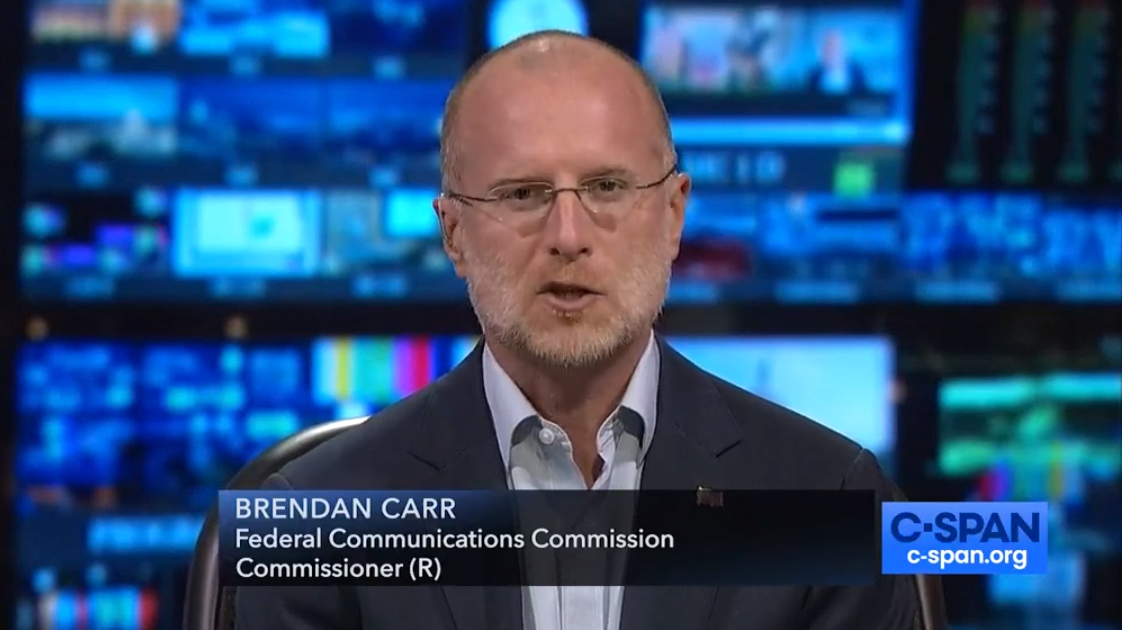FCC's Carr: Time to End 'No Touch' Regulation of Big Tech
Said FCC needs to move forward on Sec. 230

The smarter way to stay on top of the multichannel video marketplace. Sign up below.
You are now subscribed
Your newsletter sign-up was successful
Republican FCC commissioner Brendan Carr said he is not looking for heavy-handed regulation of Big Tech, but he isn't looking for no hands either, including saying there needs to be a guiding hand when it comes to Sec. 230, and from the FCC, FTC and Justice.
In an interview for C-SPAN's Communicators series, Carr said the days of maintaining the status quo with regard to Big Tech appear to be coming to an end, adding: "I think that's a good thing."
"I think that we should bring a light-touch approach to Big Tech," Carr said, "but up until now there has been a no-touch approach."
He said that is because there has never been such a gap between the size, scale and power of an industry like Big Tech and the relative absence of regulation.
Related: Hawley Questions Sec. 230 Immunity
He said that just as there has been a transparency rule for ISPs, there should be one for Big Tech.
He also said Sec. 230, which provides Web site immunity from civil liability for most third party content, should be reined in after being expanded by the courts beyond its original intent to immunize not only the producers of content but the distributors as well.
The smarter way to stay on top of the multichannel video marketplace. Sign up below.
He said a light touch approach is right, but not touch is not in the best interests of the country.
Related: Sen. Graham Signals Twitter Subpoena
The FCC is currently considering a request from the Trump Administration to rein in Sec. 230 and Carr said he things the FCC has the authority to do so, and should. He said whether that is a rulemaking or a declaratory ruling, the FCC "should move forward."
He said the FCC needs to provide some added guidance on the language in Sec. 230.
The Trump Administration's executive order on Sec. 230, which included the petition to the FCC to weigh in on Sec. 230, came soon after the President was publicly critical of Twitter for flagging his tweets about mail-in ballots and protests. Carr was asked about the charge that Trump was trying to "work the refs" to get back at social media.
Carr came to the President's defense at the time, criticizing Twitter publicly.
Carr said, for his part, he was looking at the issue on its merits, and pointed out that there was bipartisan support for reforming Sec. 230, with bills in Congress sponsored by Republicans, Democrats, and both together.
He said the fact that the President was also seeking reform was "meaningful to a lot of people out there in terms of how they see this issue." The President has made it clear one of his motivations is his belief that Big Tech is censoring conservative speech, but not liberal.
Carr said the debate about the role of social media has shifted over the past several months from the defense that there was no bias or market power being applied by Big Tech to "of course they're allowed to be biased because they are private platforms.
Carr said that is fine, but then the issue becomes: "Can they engage in this biased conduct within the meaning of Sec. 230 or have their content moderation practices far outstripped what Congress had in mind when it passed that provision.
He said he was not looking to eliminate Sec. 230, but make a modified and clarified Sec. 230 part of an overall approach that includes greater scrutiny by the Federal Trade Commission and antitrust laws--enforced by both the FTC and Justice--that can keep up with fast-moving tech.
Carr's interview will air on C-SPAN Saturday, Oct. 17, at 6:30 p.n. ET, and on C-SPAN2 Monday, Oct. 19, at 8 a.m. and 8 p.m. ET.
Contributing editor John Eggerton has been an editor and/or writer on media regulation, legislation and policy for over four decades, including covering the FCC, FTC, Congress, the major media trade associations, and the federal courts. In addition to Multichannel News and Broadcasting + Cable, his work has appeared in Radio World, TV Technology, TV Fax, This Week in Consumer Electronics, Variety and the Encyclopedia Britannica.

